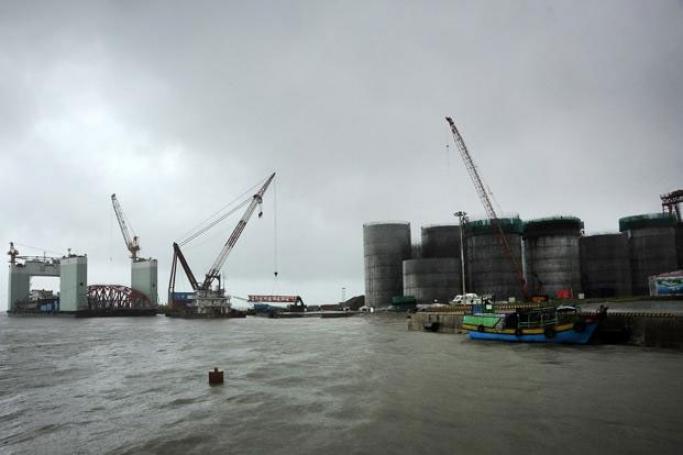Kyauk Phyu Port has been on the drawing board since November 2018 when a framework agreement was signed between the Kyauk Phyu Special Economic Zone (KPSEZ) and China International Trust Investment Corporation (CITIC). This agreement was to address two pressing issues for China’s BRI ambition at that time.
In the first instance it was used a catalyst to defuse the escalating environmental and international pressure to bear on the now sidelined Myitsone Dam hydro-power project. Secondly, China had to find an alternative to the collapse of the planned Bangladesh / Myanmar/ India / China economic corridor. The framework agreement gave life to China’s strategic west coast ocean outlet under the new banner of the China-Myanmar Economic Corridor (CMEC). Kyauk Phyu Port is a key project to deliver a sustainable CMEC.
But since then, there has been significant changes in the geo-politics, with the military coup and the ousting of many of the original KPSEZ committee. All of these resulted in the stalling of Kyauk Phyu. There has however been recent activity around the Kyauk Phyu Port development. In July 2021 there was a tender for the provision of legal services to the KPSEZ, with the closing date of 10 August 2021 having passed and no announcement of the winning bid. Further development took place on the 15th of September 2021 when the China Communication and Construction Company being awarded a contract to conduct consultancy services and preliminary field investigations into Kyauk Phyu.
Whilst this activity would suggest that the project was back on track, there are several issues that suggest that all is not well. When trying to ascertain what the state affairs was with regards the project, there has been a veil of silence and associated media blackout, with one former KPSEZ committee member saying, “the topic is now taboo”, and another current KPSEZ committee member saying that he has been advised to make no comment on the matter.
The difficulty in getting transparency and visibility of the project suggests that there is tension between China and Myanmar’s military Junta. People on the ground are suggesting that the military are pushing to get traction in the short term as it tries to deflect from the parlous state of the nation following the Coup. It knows it needs to show Myanmar citizens that it is capable of development.
China on the other hand, are trying to delay matters as it copes with a few contentious fronts. At a macro domestic level, China's crackdown on their domestic private sector is slowing innovation in an environment that swiftly crushes any sources of political anxiety. The current crop of entrepreneurial success was founded by individuals during China's most open period, 1980s to late 2000s. That era ended in 2013, with policy changes accelerating since 2018. This has significant impact on the development of smart port capability in Kyauk Phyu as it would need to have seamless digital integration and data transfer with China’s BRI / Digital Silk Road network. At another level, President Xi Jinping appears to be trying to stave off leadership contenders as the country grapples with power outages, a real estate collapse and friction with his major trading partners. This has not been helped by the uncertainty around the Olympics and the related missing tennis star Peng Shuai. With the USA announcing a diplomatic boycott, Chinese pride has been damaged, but more importantly this information has yet to be heard on the streets of Beijing. A diplomat in Beijing has suggested that Xi Jinping is having increasing difficulty stopping spread of information through social media. In some instances, WeChat accounts have been frozen.
Of immediate concern to Xi Jinping is the imminent collapse of the Evergrande property development group with the group’s announcement on the 7 December 2021 that it will not be able to repay its debts. Evergrande is not the only property company on the brink. Fantasia is another Hong Kong based company that looks as if it will be filing for liquidation soon. Whilst the PBOC and government authorities have resisted bailing these companies out, the domestic ramifications of their failure will have significant political impacts. Not only will it place several their citizenry under significant financial pain, but there are also several key political players that may not be too happy if there is no bail out. Their connections go directly to the Shanghai faction led by Jiang Zemin, who want Xi Jinping to step down as leader.
Then there is the issue of Taiwan. In recent times Japan’s support of Taiwan’s defence has signalled a greater international move to push back against China. Whilst domestically Taiwan played to nationalism it has not resonated on the international stage.
Senior EU diplomats are suggesting that important factions within the CCP are questioning Xi Jinping’s leadership. Some have gone as far as to suggest that the Beijing Olympics is the glue holding the party together, but when this glue disappears, China will go through a tumultuous time.
What does this mean for Kyauk Phyu? The KPSEZ and the military junta should not be overly reliant on China to deliver. It has significant headwinds that would suggest China needs to focus on control over its domestic audience. This is vital when one considers that total domestic debt in China is at close to 300% of GDP – there is no more room to extend debt. Why would China’s domestic audience be willing to accept the financing of a foreign based project when their own economy is under significant strain.
Maybe it is time that the EU and the Myanmar Junta start looking to using funds from the newly proposed EU infrastructure strategic initiative. Part of those discussions could include Aung Suu Khyi’s release and a return to a civilian government in Myanmar. This is an opportunity for the Military Junta to create a win – win result rather than face the current trajectory that Kyauk Phyu is a Port to nowhere.












